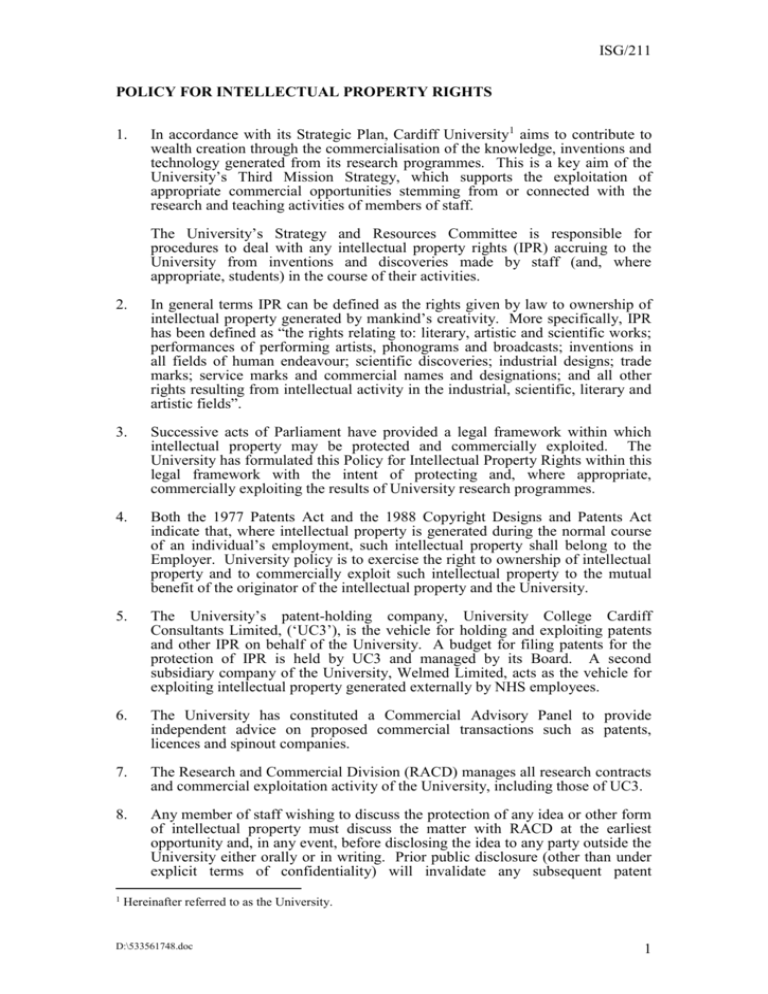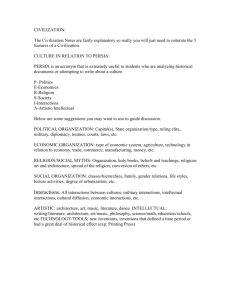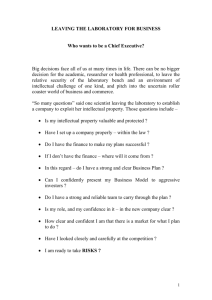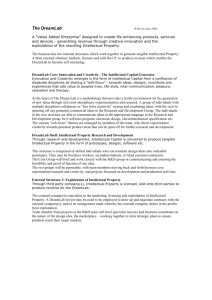Policy for Intellectual Property Rights
advertisement

ISG/211 POLICY FOR INTELLECTUAL PROPERTY RIGHTS 1. In accordance with its Strategic Plan, Cardiff University1 aims to contribute to wealth creation through the commercialisation of the knowledge, inventions and technology generated from its research programmes. This is a key aim of the University’s Third Mission Strategy, which supports the exploitation of appropriate commercial opportunities stemming from or connected with the research and teaching activities of members of staff. The University’s Strategy and Resources Committee is responsible for procedures to deal with any intellectual property rights (IPR) accruing to the University from inventions and discoveries made by staff (and, where appropriate, students) in the course of their activities. 2. In general terms IPR can be defined as the rights given by law to ownership of intellectual property generated by mankind’s creativity. More specifically, IPR has been defined as “the rights relating to: literary, artistic and scientific works; performances of performing artists, phonograms and broadcasts; inventions in all fields of human endeavour; scientific discoveries; industrial designs; trade marks; service marks and commercial names and designations; and all other rights resulting from intellectual activity in the industrial, scientific, literary and artistic fields”. 3. Successive acts of Parliament have provided a legal framework within which intellectual property may be protected and commercially exploited. The University has formulated this Policy for Intellectual Property Rights within this legal framework with the intent of protecting and, where appropriate, commercially exploiting the results of University research programmes. 4. Both the 1977 Patents Act and the 1988 Copyright Designs and Patents Act indicate that, where intellectual property is generated during the normal course of an individual’s employment, such intellectual property shall belong to the Employer. University policy is to exercise the right to ownership of intellectual property and to commercially exploit such intellectual property to the mutual benefit of the originator of the intellectual property and the University. 5. The University’s patent-holding company, University College Cardiff Consultants Limited, (‘UC3’), is the vehicle for holding and exploiting patents and other IPR on behalf of the University. A budget for filing patents for the protection of IPR is held by UC3 and managed by its Board. A second subsidiary company of the University, Welmed Limited, acts as the vehicle for exploiting intellectual property generated externally by NHS employees. 6. The University has constituted a Commercial Advisory Panel to provide independent advice on proposed commercial transactions such as patents, licences and spinout companies. 7. The Research and Commercial Division (RACD) manages all research contracts and commercial exploitation activity of the University, including those of UC3. 8. Any member of staff wishing to discuss the protection of any idea or other form of intellectual property must discuss the matter with RACD at the earliest opportunity and, in any event, before disclosing the idea to any party outside the University either orally or in writing. Prior public disclosure (other than under explicit terms of confidentiality) will invalidate any subsequent patent 1 Hereinafter referred to as the University. D:\533561748.doc 1 ISG/211 application and diminish both potential commercial value and benefits accruing to the University and the inventor(s). 9. A record will be kept of the date and time on which a member of staff reports to RACD that he or she is the inventor of a creative product. RACD is responsible for keeping a register of all patents owned by the University and/or UC3 and of those patents assigned to third parties where a member of University staff is a named inventor. 10. Sponsored research contracts will, in most instances, allow the University to retain ownership of the arising intellectual property in order to enable the University to control its commercial exploitation. Care must be taken in such contracts to ensure that adequate provision is made for the proper exploitation of arising intellectual property. 11. In pricing sponsored research contracts, RACD will give due consideration to the potential value of resulting intellectual property as well as the value of any pre-existing, background intellectual property, software or patented inventions which may be used in furtherance of the research project. 12. Copyright in any work produced by an employee in the course of employment belongs to the employer. The University, however, normally reassigns ownership of copyright in any work to the author and waives any claim it may have to benefits arising from publication, with the exception of the following, which shall belong to the University: (i) Copyright in course materials produced in the course of employment for the purposes of the curriculum of a course being run or to be run by the University and which are produced, used or disseminated within or by the University; (ii) Copyright in works produced with financial support from an external organisation where the terms of such funding require the University to license or assign copyright in the work to the funding organisation or to any third party; (iii) Copyright in any software program generated in the normal course of University employment; (iv) Copyright in any designs, specification or other works which may be necessary to protect rights in commercially exploitable intellectual property. 13. The University recognises that students, whether undergraduate or postgraduate, may generate, or contribute to the generation of, intellectual property while carrying out research projects at the University. Notwithstanding the fact that the University is not the employer of students enrolled at the University and, as such, does not normally seek to claim ownership of rights in intellectual property generated by students, the University will take assignment of intellectual property generated by students in the following circumstances: (i) D:\533561748.doc where the terms of the student’s financial support requires the University to be the owner of any intellectual property created, such as in the case of a postgraduate studentship sponsored by a Research Council-or a company; or 2 ISG/211 (ii) where the student is the legal owner of intellectual property generated in the course of his or her work but elects, at his/her sole discretion, to assign ownership to the University. Where the University decides, in its absolute discretion, to exploit commercially any intellectual property assigned to the University in accordance with either (i) or (ii) above, the student inventor will be treated in the same way as an employee inventor. All costs of protecting the intellectual property will be met by the University’s commercialisation company (UC3) and any revenue received by UC3 from commercial exploitation will be shared with the inventor(s), whether students or staff, in accordance with UC3's revenue-sharing arrangement in force at the time. 14. The negotiations to license or assign University intellectual property will be conducted on its behalf by RACD, and the legal documents to implement agreements will, in most instances, be drafted by the external Solicitors who advise the University and UC3 on intellectual property matters. 15. When a licence agreement has been entered into, RACD shall be responsible for ensuring that its terms are complied with, that the proper royalties are received by the University via UC3, and that all income arising is properly distributed in accordance with the revenue-sharing arrangement. 16. The University share of royalty income is utilised to offset the annual costs of maintaining patents and licences and any under-recovery is found from the annual funding allocation made by the University to RACD. 17. The basis of sharing of rewards with academic staff and students for their contribution to a successful exploitation is shown below. Of the income received by UC3 from the commercial exploitation of any intellectual property, the first £2,000 of any net income received for any single item will be paid to the member(s) of staff and/or student(s) who generated the intellectual property. Thereafter, the cumulative net revenue (after taking into account patent, legal and external marketing costs) received by UC3 will be shared between the Inventor(s), the Inventor(s) School(s) and the University as shown below: Inventor(s) School(s) University Net Revenues % % % First £2,000 100 0 0 Next £40,000 60 20 20 £42,000 – 200,000 50 25 25 Over £200,000 30 35 35 D:\533561748.doc 3







